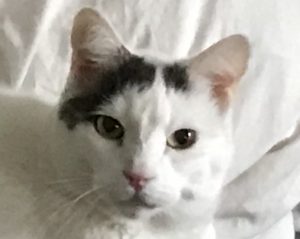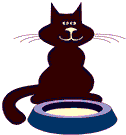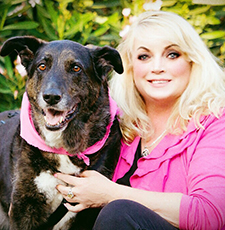 By Gail J. Carlson
By Gail J. Carlson
Professional Pet Sitting for Cats -Food Update
Catsitting Food for Thought
Are your cats picky about their food? Have a hard time pleasing your cat on their terms? Most likely you will agree that cats are fussy and picky about what they like along with how, when and what they like to eat. Get together a group of cat owners and everyone will have a different opinion when it comes to wet cat food vs. dry cat food.
To help our beloved cats we need to understand our cat’s physiology. Cats are carnivores, which means that they need muscle-based meats in their diets. Although theoretically, they might get enough protein from plant material to exist, they need the amino acid taurine to thrive. Taurine is found primarily in the muscle meat of animals.
Carnivores have short digestive systems because they are not required to break down the tough cellulose found in plants. Overall, wet food, with the primary ingredient being meat or fish, provides a meal that’s better suited to a cat’s dietary needs. Many cat owners leave dry food out all the time for their cats. Some supplement it with wet food, some don’t. Is it the equivalent of feeding your kids a steady diet of fast food for the sake of convenience?
Some fillers are necessary for the extrusion process that shapes the dry food nuggets during manufacturing. But they’re also included as a cost-savings, since they’re a cheaper ingredient than meat. I suggest you check the label on your cat’s food right now and look at the ingredients. It should list an animal protein source as its number one ingredient, and ideally, it should not contain meat by-products. While catsitting I see many various types of cat foods and cat treats. Please just take a moment to read the labels.
If your cat only eats dry food, she is likely to be getting less nutrients than a cat eating wet food. Many low quality dry foods contain a lot of fillers. In the wild, carbohydrates are only about five percent of a cat’s diet – what she gets from ingesting the stomach contents of her prey. Canned cat food averages 78% water. Dry cat food does not provide the needed moisture for cats to be hydrated and often can lead to urinary or kidney disease. Often cats who are chronically dehydrated will develop urinary crystals or renal failure. Cats need extra fresh water if they are mostly eating dry food.
Cats on dry food-only diets are slightly more like to be obese or develop diabetes than cats who eat wet food. Part of this is due to the high carbohydrate levels in many kinds of kibble, and part is due to the free-choice feeding of dry food which gives cats 24-hour access to food.
If your cat is getting a little pudgy, ration the dry food rather than serving it all-you-can-eat style. To avoid feline diabetes, stick to a premium dry food or switch to a canned food diet. Good luck and happy cats and cat love forever.










